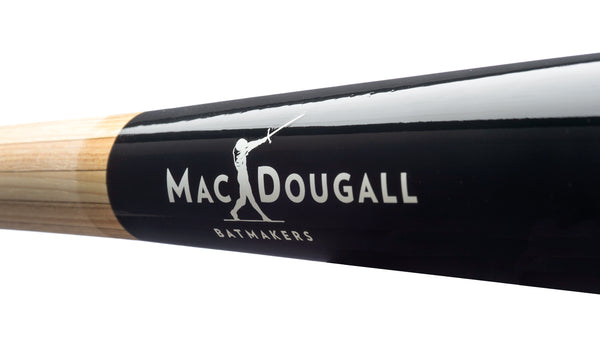Why MacDougall Bats are the Best
The Perfect Blend of Tradition and Technology
The MacDougall & Sons PowerWood™ is available in balanced and end loaded baseball models, a Youth League model bat, and ASA compliant wood Softball bats. We also make the world's coolest fungo bat, the Fungomatic. All are handcrafted and our game bats come with an industry leading One Year breakage warranty! And remember, this is a 100% real wood bat. No plastic. No foam. No fiberglass. Real wood. Mother Nature rearranged to be better! Made in the U.S.A. Patents 7972229 and 8409038.
- PROVEN to have the best head to head performance at the Sports Science Lab. Check it out!
- NCAA approved as a "solid wood bat" -- BBCOR certified
- True Hickory handle for unparalleled stiffness, effectively transferring more power into the ball.

- Super hard (and beautiful) Oregon Tanoak barrel for balance
- Lasts about 10 times longer than regular all-wood bats**
- Center-of-Balance is over an inch closer to the hands for a more balanced feel
- Moment-of-Inertia and Swing Weight numbers on every bat
- Available in lengths from 31" to 34" in 1/2" increments for custom fit
- 27" to 31" in our youth bats with a one year breakage warranty!
- Built in USA -- Bend, Oregon
It's not Rocket Science, but it's close.
PowerWood Technology goes into every bat we make. But what goes into PowerWood Technology? High- tolerance joinery, True Hickory and Tanoak hardwoods, plus a special Fusion process, to name a few. All combine to create a bat that will never shatter or explode - something other all-wood bats can't do. No foreign materials like plastic, foam, metal or fiberglass. We stay true to the Baseball Tradition.
On top of all this is a finishing process that is unparalleled in the industry. Powerwood bats are out there taking a beating for a long time so we developed a unique, 5 day long process that stands up to what the game dishes out and keeps the bat performing the same on day 500 as it does on day 1. There are 2 different products in 5 different coats on the barrel. Heat cured. The handle is asked to do different things than the barrel, so we came up with our own recipe that vacuum impregnates a Tung oil and resin mixture deep into the wood to seal it and provide resiliency, but not take away that "wood feel".
The proof is in the PowerWood.
The Baseball Research Center put the PowerWood to the test. In case you think our bats look "flexible" in these videos, rest assured they are not. That's what happens when you hit a bat on the end of the barrel at 198 mph in 15,000 frames per second video! And remember, the regular "pro model" wood bats broke a LONG time before they got to this point.
| Test speed protocol: 170 mph 2" from the end of the barrel equivalent to Albert Pujols taking a full cut at a 93 mph fastball) The PowerWood goes the first 22 hits without breaking. In fact, nothing happened until the testers increased the speed to 198 mph, when a slight fracture appeared in the barrel. The bat was still usable. The pro-model comparison bat only took seven hits at 165 mph before the handle split open. | Test speed protocol: 125 mph at the label (bat speed is slower near the hands) After 50 hits, the testers ramped the speed up to 163 mph (40 mph faster than it would see in the Majors). Nothing happened, even after 89 hits. The pro-model comparison bat only survived eight hits at 125 mph. |


